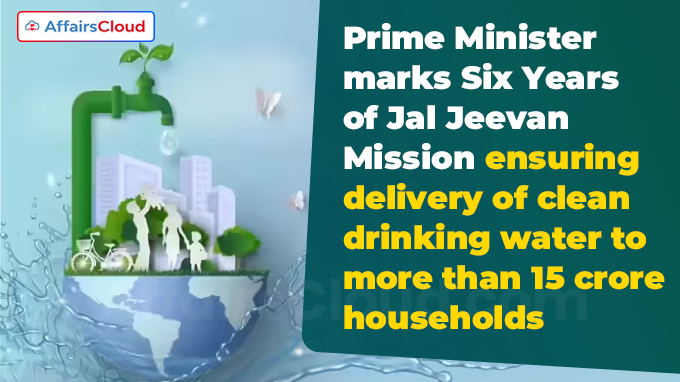 On 14 August 2025, Prime Minister (PM) of India Narendra Modi marked the completion of six years of the Jal Jeevan Mission (JJM), a nationwide initiative that has transformed access to drinking water in rural India.
On 14 August 2025, Prime Minister (PM) of India Narendra Modi marked the completion of six years of the Jal Jeevan Mission (JJM), a nationwide initiative that has transformed access to drinking water in rural India.
- The Government of India (GoI) has proposed to extend the JJM till 2028 with higher funding as announced in the Union Budget for the financial year 2025-26 (FY26).
Exam Hints:
- Event : Marked six years of Jal Jeevan Mission
- Launch:15 August 2019
- Ministry : Ministry of Jal Shakti (MoJS).
- Extension:GoI proposed extending the mission till 2028
- Objective: Provide Functional Household Tap Connection (FHTC) to every rural household.
- Key Achievements (2019–2025):Over 15.69 crore households connected (81% coverage); 2.63 lakh villages & 191 districts declared Har Ghar Jal.
About Jal Jeevan Mission (JJM):
Launches: The Ministry of Jal Shakti (MoJS) launched the Jal Jeevan Mission (JJM) on 15 August 2019 with an aim to provide every rural household with a Functional Household Tap Connection (FHTC) by 2024.
Technology: The JJM uses modern technology to make its work more open and reliable.Villages now have Internet of Things (IoT) sensors that show in real time how much water is being supplied.
Digital Monitoring: Through Aadhaar linking, benefits are delivered to the right families, while geo-tagging records the infrastructure created, and the JJM Dashboard with the Mobile Application (App) offers real-time updates on coverage and progress to the public.
Approach: The mission also gives special attention to vulnerable groups such as Scheduled Castes (SCs), Scheduled Tribes (STs), and families living in remote areas, making sure no community is left behind.
Community-Led Initiatives:
VWSCs: Villages are encouraged to prepare their own water supply plans and take responsibility for building and managing systems through Village Action Plans.
- To strengthen this effort, Village Water and Sanitation Committees (VWSCs) made up of local people handle the planning, operation, and maintenance of schemes.
Quality Management: Women play a central role in ensuring water quality, with more than 24.80 lakh women trained to test water using simple Field Test Kits, turning water safety into a community-led effort.
Pani Samitis: Women-led Pani Samitis are now managing local schemes, supported by training, toolkits, and field experience, making them strong drivers of change.
Training: Alongside this, regular training programmes, awareness campaigns, and communication activities are helping communities adopt sustainable practices and bring positive behavioural changes.
Nal Jal Mitra Programme (NJMP): The NJMP has been started by MoJS in collaboration with the Ministry of Skill Development and Entrepreneurship (MSDE) to train local people as “Nal Jal Mitras.
- These trained workers operate village water systems and handle minor repairs and maintenance.
- The plan is to have at least one, preferably two, Nal Jal Mitras in every Gram Panchayat to keep water supply running smoothly.
Key Achievements:
Initial: In 2019 only 3.23 crore homes out of nearly 19 crore rural households had access to tap water.
Expansion: As of July 2025, more than 15.69 crore rural households have been connected to tap water, covering 81% of rural India. Till now, over 2.63 lakh villages and 191 districts have been declared Har Ghar Jal.
Coverage: Tap water has now reached more than 9.5 lakh schools and 10 lakh Anganwadi centres, ensuring safe drinking water for children. In the 112 Aspirational Districts, tap water coverage has gone up to 79.32%.
Reduction in fluoride-affected areas: The number of fluoride-affected habitations has dropped sharply from 7,996 in 2019 to only 248 in 2025, protecting people from serious health risks.
Testing Infrastructure: Across the country, there are about 2,775 laboratories for testing drinking water quality at the State, District, Sub-division, and Block levels, including 591 laboratories within water treatment plants.
About Ministry of Jal Shakti (MoJS):
Union Minister– Chandrakant Raghunath (C R) Patil (Constituency-Navsari, Gujarat)
Ministers of State (MoS)– Veeranna Somanna ( Constituency- Tumakuru, Karnataka ); Raj Bhushan Choudhary (Constituency- Muzaffarpur, Bihar)




